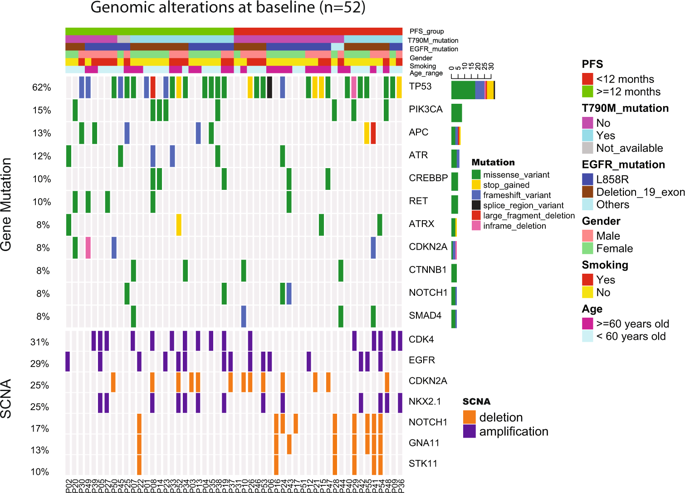Our official English website, www.x-mol.net, welcomes your
feedback! (Note: you will need to create a separate account there.)
Distinct co-acquired alterations and genomic evolution during TKI treatment in non-small-cell lung cancer patients with or without acquired T790M mutation.
Oncogene ( IF 6.9 ) Pub Date : 2019-11-21 , DOI: 10.1038/s41388-019-1104-z Ying Jin 1, 2, 3 , Hua Bao 4 , Xiuning Le 5 , Xiaojun Fan 4 , Ming Tang 5 , Xun Shi 1, 2 , Jun Zhao 1, 2 , Junrong Yan 6 , Yang Xu 4 , Kelly Quek 5 , Yasir Y Elamin 5 , Jianhua Zhang 7 , P Andrew Futreal 7 , Ignacio I Wistuba 8 , John V Heymach 5 , Guangyuan Lou 1, 2 , Lan Shao 1, 2 , Qiong He 1, 2 , Chen Lin 1, 2 , Xue Wu 4 , Yang W Shao 6 , Xiaonan Wang 6 , Jiachen He 6 , Yamei Chen 1, 3 , Justin Stebbing 9 , Ming Chen 1, 3 , Jianjun Zhang 5, 7 , Xinmin Yu 1, 2
Oncogene ( IF 6.9 ) Pub Date : 2019-11-21 , DOI: 10.1038/s41388-019-1104-z Ying Jin 1, 2, 3 , Hua Bao 4 , Xiuning Le 5 , Xiaojun Fan 4 , Ming Tang 5 , Xun Shi 1, 2 , Jun Zhao 1, 2 , Junrong Yan 6 , Yang Xu 4 , Kelly Quek 5 , Yasir Y Elamin 5 , Jianhua Zhang 7 , P Andrew Futreal 7 , Ignacio I Wistuba 8 , John V Heymach 5 , Guangyuan Lou 1, 2 , Lan Shao 1, 2 , Qiong He 1, 2 , Chen Lin 1, 2 , Xue Wu 4 , Yang W Shao 6 , Xiaonan Wang 6 , Jiachen He 6 , Yamei Chen 1, 3 , Justin Stebbing 9 , Ming Chen 1, 3 , Jianjun Zhang 5, 7 , Xinmin Yu 1, 2
Affiliation

|
EGFR-mutant non-small-cell lung cancer (NSCLC) patients inevitably develop drug resistance when treated with EGFR tyrosine kinase inhibitors (TKIs). Systematic genetic analysis is important to understand drug-resistant mechanisms; however, the clinical significance of co-occurring genetic alterations at baseline, co-acquired mutations at progressive disease (PD), and the clonal evolution remain underinvestigated. We performed targeted sequencing of pre-treatment and PD tumor samples from 54 EGFR-mutant NSCLC patients. Ten additional patients were sequenced using whole-exome sequencing to infer the clonal evolution patterns. We observed a domain-dependent effect of PIK3CA mutation at baseline on patient progression-free survival (PFS). In addition, at baseline, 9q34.3/19p13.3 (NOTCH1/STK11/GNA11) showed a co-deletion pattern, which was associated with a significantly worse PFS (p = 0.00079). T790M-postive patients with other concurrent acquired oncogenic mutations had a significantly shorter PFS (p = 0.005). Besides acquired T790M mutation, chromosomal instability (CIN) related genes, including AURKA and TP53 alterations, were the most frequently acquired events. CIN significantly increased during TKI treatment in T790M-negative patients and is a candidate resistance mechanism to the first-generation TKIs. Clonal evolution analyses suggest that the composition and relationship among resistant subclones, particularly relationship with T790M subclone, affect patients' outcomes. Overall, our findings of novel co-occurring alterations and clonal evolution patterns can be served as predictive biomarkers to stratify patients and help to better understand the drug-resistant mechanism to TKIs.
中文翻译:

在有或没有获得性 T790M 突变的非小细胞肺癌患者中,TKI 治疗期间明显的共同获得性改变和基因组进化。
EGFR 突变的非小细胞肺癌 (NSCLC) 患者在使用 EGFR 酪氨酸激酶抑制剂 (TKI) 治疗时不可避免地会产生耐药性。系统的遗传分析对于了解耐药机制很重要;然而,基线时同时发生的基因改变、进行性疾病 (PD) 时共同获得的突变以及克隆进化的临床意义仍未得到充分研究。我们对来自 54 名 EGFR 突变 NSCLC 患者的治疗前和 PD 肿瘤样本进行了靶向测序。使用全外显子组测序对另外 10 名患者进行测序,以推断克隆进化模式。我们在基线时观察到 PIK3CA 突变对患者无进展生存期 (PFS) 的结构域依赖性影响。此外,在基线时,9q34.3/19p13.3 (NOTCH1/STK11/GNA11) 显示出共缺失模式,这与显着更差的 PFS 相关(p = 0.00079)。具有其他同时获得性致癌突变的 T790M 阳性患者的 PFS 显着缩短(p = 0.005)。除了获得性 T790M 突变外,染色体不稳定性 (CIN) 相关基因,包括 AURKA 和 TP53 改变,是最常见的获得性事件。T790M 阴性患者在 TKI 治疗期间 CIN 显着增加,是第一代 TKI 的候选耐药机制。克隆进化分析表明,耐药亚克隆之间的组成和关系,特别是与 T790M 亚克隆的关系,会影响患者的预后。总体,
更新日期:2019-11-21
中文翻译:

在有或没有获得性 T790M 突变的非小细胞肺癌患者中,TKI 治疗期间明显的共同获得性改变和基因组进化。
EGFR 突变的非小细胞肺癌 (NSCLC) 患者在使用 EGFR 酪氨酸激酶抑制剂 (TKI) 治疗时不可避免地会产生耐药性。系统的遗传分析对于了解耐药机制很重要;然而,基线时同时发生的基因改变、进行性疾病 (PD) 时共同获得的突变以及克隆进化的临床意义仍未得到充分研究。我们对来自 54 名 EGFR 突变 NSCLC 患者的治疗前和 PD 肿瘤样本进行了靶向测序。使用全外显子组测序对另外 10 名患者进行测序,以推断克隆进化模式。我们在基线时观察到 PIK3CA 突变对患者无进展生存期 (PFS) 的结构域依赖性影响。此外,在基线时,9q34.3/19p13.3 (NOTCH1/STK11/GNA11) 显示出共缺失模式,这与显着更差的 PFS 相关(p = 0.00079)。具有其他同时获得性致癌突变的 T790M 阳性患者的 PFS 显着缩短(p = 0.005)。除了获得性 T790M 突变外,染色体不稳定性 (CIN) 相关基因,包括 AURKA 和 TP53 改变,是最常见的获得性事件。T790M 阴性患者在 TKI 治疗期间 CIN 显着增加,是第一代 TKI 的候选耐药机制。克隆进化分析表明,耐药亚克隆之间的组成和关系,特别是与 T790M 亚克隆的关系,会影响患者的预后。总体,











































 京公网安备 11010802027423号
京公网安备 11010802027423号